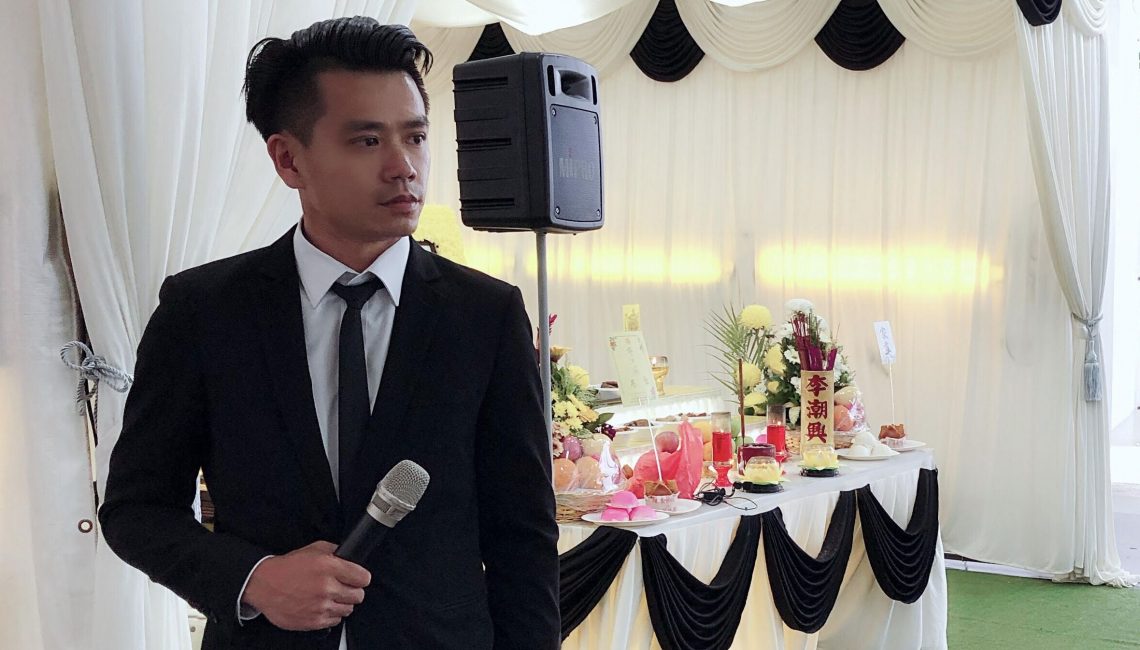This is an interview series with funeral directors in Singapore. Read about how they help you through a time of bereavement and get tips for choosing one when the need arises.
We speak with Jeffrey Lee from Embrace Funeral Services.
Why did you become a funeral director?
Our family has been in this business for four generations after my great-grandfather arrived in Singapore from China. As a young boy, I followed my grandfather and father around as they worked. I found this career path of helping bereaved families find closure very meaningful. We also have the responsibility of giving the deceased a proper send-off and conducting rituals correctly.
I am extremely proud of what my grandfather and father do, especially when I hear how old friends and customers express their gratitude or sing their praises of a job done well. Some of these funerals were held decades back!
Another reason for me to join the business is because I want to ensure its continuity as age is catching with my grandfather and father.
I’m also motivated to continue their generous spirit of providing pro-bono funeral services to the needy. It is not only a job, but it is also our family’s calling.
What qualifications do you need to become one?
1. Compassion. You have to have a compassionate heart to serve and help families during their difficult times. You can’t just treat this as a job. It is more than that; it is a calling.
2. Courage. You need this to handle dead bodies, including those who passed away due to accidents or unnatural causes.
3. Conversational skills. Our words come from our knowledge and expertise. Deceased families find comfort in what we say to them, so we have to be tactful when we handle their fragile emotions during this difficult time.
4. Empathy. We have to empathise with the family, achieving a state of mind of “serving the deceased as if our own”(视丧如亲). So we can serve with our heart, provide the deceased families with our best service, and help them find comfort and closure.
5. Emotional intelligence. A funeral director has to be able to handle his emotions. We deal with grief daily and get customers from all walks of life.
6. Integrity and a sense of responsibility. We never take short cuts. We are the specialists and the customers usually are not sure of the rites and practices involved. Our team always makes sure we do things properly and advise clients correctly. Some of our work takes place behind the scenes, such as embalming and dressing the deceased. We have to do it properly and appropriately even when no one is watching.
In short, we place more emphasis on personality and character instead of academic qualifications.
How long have you been in your role? Why did you choose to be in this profession?
I came back to join the business after leaving the financial industry a few years ago. I chose to come back because this is where I am happy. I also feel a responsibility to carry on with the family business, and I feel a great sense of satisfaction for every funeral we complete.
Describe a typical day on the job for yourself and your team.
We are on standby 24 hours a day. When we are informed of a death, our team will be activated to be with the grieving family within one and one-and-a-half hours.
A typical day sees us discussing funeral proceedings with the family, collecting the bodies, cleaning the bodies, dressing and applying make up for the deceased, arranging and coordinating with the sub-contractors and religious personnel for processes, setting up funerals, advising families on the procedures to carry out and what to look out for, such as what traditional rites to follow and assist them to decide where is the best place to store the ashes.
We visit funeral wakes daily, walk the grounds to check that things are in place, and see if families encounter any questions or issues, have additional requests, or to finalise funeral arrangements.
We are specialists in funeral rituals, we will conduct the final rites and farewell ceremony (告别仪式) on the last day of the funeral, and send the casket off for cremation or burial. So our typical day involves us travelling around the island.
After the cremation, we help to collect the ashes and place the ashes into urns and settle them in columbariums, or bring them out for sea burial.
We also provide free on-going support to our customers who may occasionally call us to clarify funeral traditions or rites to follow and handle other queries.
We also take care of grave exhumations and moving of ashes. This includes administrative work, meeting customers, selecting auspicious dates and times. During exhumation, we will pick up the bones of the deceased, clean and send them to the columbariums.
We provide pre-planning funeral consultation too and meet with customers who need advice when someone in the family is close to passing on.
So yes, a typical day is quite busy.
Which part of your job do you find most satisfying?
Every job or funeral completed and done well is a great source of satisfaction to us.
Which part of your job do you find most challenging?
Unlike normal businesses, our operating times are very unpredictable.
If you could change something about what you do, what would that be? Why?
We are always looking for new ideas and constantly thinking about how we can serve or help our customers better. So rather than thinking of changing, it is more about what we can keep improving. We apply the Japanese concept of Kaizen in our daily work.
What makes you well-suited for your role as a funeral director?
I am compassionate and can empathise with my clients.
My team also knows the rituals, traditions and reasons behind the practices of all religious funeral rites (other than Muslims and Hindus as we don’t handle them) and the differences in every dialect group, how to conduct their rites, and what the rituals mean.
Which services are most requested for by clients?
They want us to be attentive to their needs and sensitive to their feelings.
Is there something about funeral directors that you would like clients to better understand?
Most of our staff members have very compassionate hearts with great empathy for our clients. We keep every bereaved family and every deceased person close to our hearts. We do not become numb to death and grief even though we encounter it daily. Instead, our compassion for them grows. The more we understand the vulnerability of life and death is part of the natural cycle of life, we will look at life and things from a different perspective. We embrace death and life, and we embrace our customers by serving them as if they are our own family because we are able to feel for them and empathise with them.
Who is someone that inspires you? Why?
My Grandfather, who is also my grandmaster.
When my great grandfather died at an early age, he carried the responsibility for the whole family’s livelihood on his shoulders. He dropped out of primary school to allow his younger brothers to continue school and built up this business to provide for his mother, siblings and his own family.
He started the business from scratch and learnt every important aspect of the business. He cleaned and embalmed bodies, coordinated with the religious personnel, conducted the rituals, serviced clients, arranged and directed the set-up of the wake, built the coffins, exhumed graves by hand, packed and prepared joss products, paper effigies and decorated the traditional paper hearse. He even picked up calligraphy on his own. My grandfather is truly an expert in terms of skills and knowledge of rituals, traditions, beliefs.
Sometime in the 1950s or 1960s, someone burned down our family’s old wooden shophouse. Despite this, he did not despair. My grandparents and granduncle, my father, together with other family members and staff rolled up their sleeves and worked very hard to rebuild the business. Some of his friends even offered us obligation-free monetary assistance. We are still grateful for their help to this day.
Even with the challenge of rebuilding his business, my grandfather continued to be very generous and charitable. Many of his longtime friends, especially those who were from the same kampung, always tell me about how he would help people in need, and he never rejected anyone who approached him. I often hear about his charitable deeds from the people he has helped and my father’s friends, but he doesn’t brag about them. He always believed that doing charity should not be confused as advertising for the business.
He came up with our core business value and passed it on to us – caring like family, serving the deceased as if our own (视丧如亲). He continues to work even today and comes to the shop daily to oversee our operations.
How should someone who has just lost a close family member shortlist and appoint a funeral director?
Look for someone who is compassionate and knowledgeable, someone who knows the rituals and traditions, someone who feels for you and places your family’s feelings first.
Your funeral director should be responsible and passionate about his or her work.
Also, look for someone who is transparent about his pricing structure and offers fair pricing.

